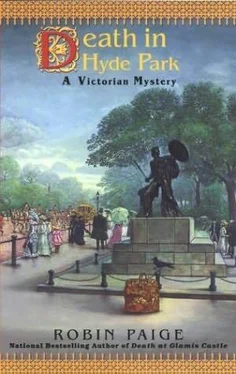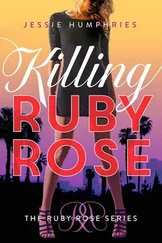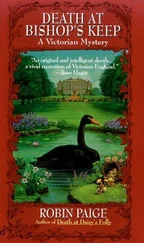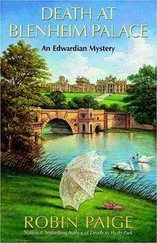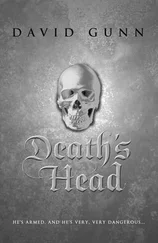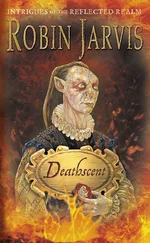Robin Paige - Death in Hyde Park
Здесь есть возможность читать онлайн «Robin Paige - Death in Hyde Park» весь текст электронной книги совершенно бесплатно (целиком полную версию без сокращений). В некоторых случаях можно слушать аудио, скачать через торрент в формате fb2 и присутствует краткое содержание. Жанр: Классический детектив, на английском языке. Описание произведения, (предисловие) а так же отзывы посетителей доступны на портале библиотеки ЛибКат.
- Название:Death in Hyde Park
- Автор:
- Жанр:
- Год:неизвестен
- ISBN:нет данных
- Рейтинг книги:5 / 5. Голосов: 1
-
Избранное:Добавить в избранное
- Отзывы:
-
Ваша оценка:
- 100
- 1
- 2
- 3
- 4
- 5
Death in Hyde Park: краткое содержание, описание и аннотация
Предлагаем к чтению аннотацию, описание, краткое содержание или предисловие (зависит от того, что написал сам автор книги «Death in Hyde Park»). Если вы не нашли необходимую информацию о книге — напишите в комментариях, мы постараемся отыскать её.
Death in Hyde Park — читать онлайн бесплатно полную книгу (весь текст) целиком
Ниже представлен текст книги, разбитый по страницам. Система сохранения места последней прочитанной страницы, позволяет с удобством читать онлайн бесплатно книгу «Death in Hyde Park», без необходимости каждый раз заново искать на чём Вы остановились. Поставьте закладку, и сможете в любой момент перейти на страницу, на которой закончили чтение.
Интервал:
Закладка:
Nellie shook her head. “Lottie, you are so brave.”
Lottie laughed. “Brave? Foolhardy is more like it. Smuggling them out won’t be easy, since the Yard is probably looking everywhere for them. But we have to try.”
Kate remembered the anger she had felt when the jury’s verdict was announced, and her feeling that justice had not been served.
“Yes,” she said firmly. “You have to try.” She bent forward and kissed Lottie’s cheek. “Good luck, Lottie. We’ll be thinking of you and wishing you well.”
CHAPTER THIRTY-THREE
There is no denying the aesthetic satisfaction, the sense of poetic justice, that pleasures us when evil-doers get the comeuppance they deserve… The satisfaction is heightened when it becomes possible to measure out punishment in exact proportion to the size and shape of the wrong that has been done.
Arthur Lelyvekl, Punishment: For and AgainstFormer Inspector Ashcraft was in a mood as black as the coffee he was stirring. From his seat in the corner booth, he was keeping one eye on the entry to the Little Moscow Cafe, although he was not sure that his message had been received-or if it had, that his contact would respond.
Early that morning, Assistant Commissioner Henry had called both Ashcraft and Chief Inspector Mattingly into his office. He was obviously angered not only by the debacle of the trial but also by the Anarchists’ escape, the news of which had stunned Ashcraft into a bewildered disbelief. How had the wardens been so lax as to allow their keys to be stolen and the men to escape? The Anarchists were known to be dangerous-why had there not been a larger guard, more effective security procedures? Who was responsible for But the inspector had not been able to give voice to any of the questions and doubts that stirred like a storm within him. He was required to stand at attention and listen as the assistant commissioner made it plain that he had only two choices: He could resign his position and leave Special Branch quietly, without any fanfare; or he could stay and face an internal investigation and, quite possibly, a public trial. The decision had been wrenching, for Ashcraft had wanted to proclaim to the world that he had done what he did only because it was his duty to keep the streets of London safe from Anarchists. His duty had required him to stretch the law, and justified him in stepping outside of its bounds when necessary. But the assistant commissioner did not want to hear any explanations or justifications; he only wanted to castigate him for breaking the law and embarrassing the Yard. And of course, Chief Inspector Mattingly could never acknowledge that he had encouraged Ashcraft to do what he had to do to bring the Anarchists to justice, and especially Kopinski, whom the Russians badly wanted. The inspector had taken the easiest way, and resigned.
But there was something else, too, that had figured in Ashcraft’s decision, something that he feared might come to light if he were swept up in an investigation. He knew, in the deepest recesses of his heart, that it was Charlotte Conway who had been his undoing. Even now, and even to himself, he was not prepared to admit how desperately he had wanted the girl. The more he had watched her through that lighted bedroom window, or tripping down the street, or bending over her desk in the newspaper loft, the stronger his desire had grown. And since he could not have her, something inside him-some fiercely passionate part of him that he could barely recognize as himself-had determined that no other man would have her, either.
It was this determination that had led to his fundamental error, for when the raid had inadvertently netted Charlotte Conway’s lover along with Kopinski and Mouffetard, Ashcraft had decided to take advantage of the situation. He should, of course, have released Adam Gould and been done with it. There was no question of finding evidence against the man, since Ashcraft knew he was not involved with the Anarchists. But since he had determined to ensure the conviction of Kopinski and Mouffetard-and especially of Kopinski-it seemed a small matter to make up another bottle and put it under Gould’s bed. He could not have known that the young man was a friend of some overly-enthusiastic lord who thought he knew something about fingerprints and wanted to meddle in police matters. If Sheridan had not organized the defense, it was likely that the whole thing would have come out exactly as he had anticipated, with guilty verdicts for all three.
“I received your message from Petrovich,” a voice said. There was a tone of deep disdain in it. “You wanted to see me?”
Ashcraft had become so deeply absorbed in his thoughts that he had not seen the tall, stooped-shouldered man enter the cafe. The man slipped into the booth on the opposite side of the table and regarded him with watchful eyes. There was nothing inside the man, Ashcraft thought drearily, no devotion to duty, no humanity, only that cold, uncaring, never-ending vigilance. Didn’t these Russians ever stop watching?
Tropov rested his elbows on the table. “What is it you want?” he asked finally. Ashcraft knew, by the tone of his voice, patronizing and contemptuous, that he had heard about the trial and guessed, no doubt, that he had been dismissed.
“I have something for you,” Ashcraft said stolidly. “Something that might be of value in your work.” Reaching into his coat pocket, he took out a small black notebook. His eyes lingered on it as he placed it carefully in the center of the table. Offering it to Tropov-was it a betrayal of his duty? Was he somehow giving aid to an enemy he did not fully understand?
No, his notes on the Hyde Park affair and the lists of names of the men and women who had served the Yard as informants-this was not evidence, but merely his own personal jottings. And since Assistant Commissioner Henry himself had made it clear that Ashcraft’s services were no longer required and the Hyde Park matter was closed, Ashcraft felt himself at liberty to do what he liked with his personal records. Moreover, it did not matter that Tropov served the Russian secret police. They were both on the same side, ultimately: the side of law and order, opposed to the death against lawlessness, chaos, and disorder.
Sitting across the table, Dmitri Tropov picked up the notebook and thumbed the pages. If he felt anything at all, it was something like contempt. He saw little that was new to him, and nothing that was of any particular interest. However, since the notebook contained Ashcraft’s personal notes, a closer reading might reveal something of the strange workings of the English, and for that reason might have some marginal value. This was his last meeting with Ashcraft, but there would no doubt be other policemen with whom he would have to deal. He tossed the notebook on the table in front of him.
“And why is it that you want me to have this?” he asked. It was an idle question, for nothing that Ashcraft had to tell him could be of any interest to him now.
Ashcraft turned away, appearing to be absorbed in the graceful movements of the balalaika player who was taking his seat on a stool in the corner. In a muffled voice, he said, “I assume that you have heard what transpired at the trial yesterday. You must know, as well, about the escape.”
“Right on both counts,” Tropov said carelessly. “And if you’re asking if I know where Kopinski and Mouffetard have got to, the answer is no. I have no idea.” He clicked his tongue scoldingly against the back of his teeth. “Careless of you, that business about the ginger-beer bottles. But it would have come out just the same in the end. They would all three have escaped. In Russia, of course, we would not have let that happen.”
Ashcraft turned back. A dullness seemed to have settled in his eyes, and his shoulders slumped as if he had suddenly become very weary. “My superiors have determined that my services are no longer required.” His voice was flat, without depth or resonance. “I was sacked this morning.”
Читать дальшеИнтервал:
Закладка:
Похожие книги на «Death in Hyde Park»
Представляем Вашему вниманию похожие книги на «Death in Hyde Park» списком для выбора. Мы отобрали схожую по названию и смыслу литературу в надежде предоставить читателям больше вариантов отыскать новые, интересные, ещё непрочитанные произведения.
Обсуждение, отзывы о книге «Death in Hyde Park» и просто собственные мнения читателей. Оставьте ваши комментарии, напишите, что Вы думаете о произведении, его смысле или главных героях. Укажите что конкретно понравилось, а что нет, и почему Вы так считаете.
